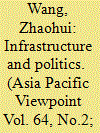| Srl | Item |
| 1 |
ID:
153677


|
|
|
|
|
| Summary/Abstract |
This paper examines the symbiotic but asymmetric relationship between the United States as the core and China as the semi-periphery. It argues that China’s policy response in both domestic and international domains after the global financial crisis reveals that China as a rising power is no longer a rule-taker, but between a rule-maker and a rule-breaker that adds incremental reforms to current international institutions.
|
|
|
|
|
|
|
|
|
|
|
|
|
|
|
|
| 2 |
ID:
192940


|
|
|
|
|
| Summary/Abstract |
The article seeks to understand the different types and sources of politicisation as well as the consequences for Belt and Road Initiative infrastructure projects. It is argued that while the personalised insulated type of foreign policymaking is conducive to intra-system politicisation, the institutionalised responsive type is associated with extra-system politicisation. While the former type is contingent on political turnovers and brings about abrupt shocks, the latter oftentimes generates societal pushback from socio-economic groups. The article focuses on two flagship Belt and Road Initiative infrastructure projects in Malaysia and Indonesia. Based on fieldwork interviews and process tracing, the article finds that the East Coast Rail Link project in Malaysia has suffered from high risk of political interruption owing to Malaysia's personalised insulated type of foreign policymaking, whereas the Jakarta–Bandung High Speed Rail project in Indonesia has encountered sustained obstacles from Indonesian society and brought about substantial delays under Indonesia's institutionalised responsive type.
|
|
|
|
|
|
|
|
|
|
|
|
|
|
|
|
| 3 |
ID:
156259


|
|
|
|
|
| Summary/Abstract |
The article analyzes the resumption of China’s exchange rate reform from June 2010. It finds that, while the Congress’s influence on the RMB issue generally diminished over time after the global financial crisis, international criticism and pressure from the US administration and the IMF still played an important role of agenda-setting in China’s exchange rate policy-making in 2010. The Chinese leadership stood firm to the external pressure and demonstrated solidarity and consistency towards the exchange rate policy. It argues that, with the development of RMB internationalization and increasing capital account openness, a flexible exchange rate was the feasible choice to preserve the independence and effectiveness of China’s monetary policy, which produced the Chinese leadership’s consensus on the RMB exchange rate reform in 2010. The RMB appreciated steadily and gradually against the dollar in the second round of exchange rate reform, aiming to improve confidence and promote the international use of RMB.
|
|
|
|
|
|
|
|
|
|
|
|
|
|
|
|